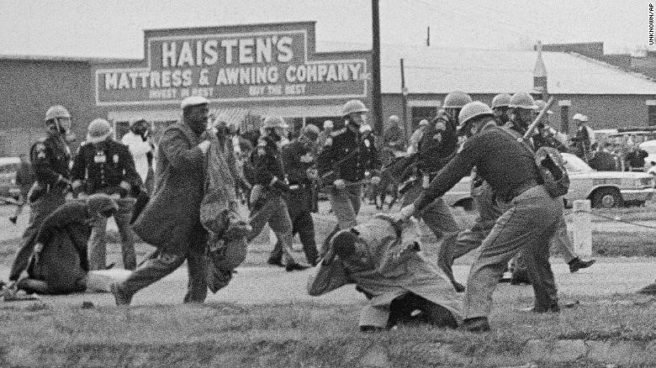
A 25 year old John Lewis being beaten on “Bloody Sunday,” March, 7, 1965.
The fight for equality and racial justice has lost two great titans, Rep. John Lewis and Rev. C.T. Vivian. Both worked alongside Dr. Martin Luther King, Jr. during the 1960s, risking their lives to ensure freedom for millions of Americans. Throughout their lives and careers, Lewis and Vivian continued to serve as activists, advocates, educators and allies for social progress. Lewis’ voice from the podium and Vivian’s from the pulpit always championed equality, justice, and freedom.
In the 1960s, Lewis was chairman of the Student Nonviolent Coordinating Committee, one of the key organizations behind the 1963 March on Washington, where he was the youngest keynote speaker. In 1965, Lewis helped lead the march from Selma to Montgomery, Alabama to protest discriminatory practices that prevented Black people from voting in the South. Their route took them to Selma’s Edmund Pettus Bridge, named after a high-ranking officer in the Confederate Army, a man who served as a Grand Dragon in the Ku Klux Klan. On March 7, Lewis and his fellow marchers were met by heavily armed local and state police who attacked them with clubs, fracturing Lewis’ skull, on what became known as “Bloody Sunday.” Images from that “Bloody Sunday” shocked the nation and galvanized support for the Voting Rights Act of 1965, signed into law by President Lyndon B. Johnson that year.
Lewis, a Democrat who served as a U.S. Representative for more than three decades, was called “the moral conscience of Congress” because of his belief in a nonviolent fight for civil rights. His passion for equal rights was backed by a long record of action that included dozens of arrests during protests against racial and social injustice. By his own count, Lewis was arrested more than 40 times. The Congressional Black Caucus, of which Lewis was the longest serving member, said “The world has lost a legend; the civil rights movement has lost an icon, the city of Atlanta has lost one of its most fearless leaders, and the Congressional Black Caucus has lost our longest serving member… John Lewis was known as the conscience of our caucus.”
C.T. Vivian was also a giant in the civil rights movement and in the broader struggle for racial equality. Working alongside Dr. King, he served as the national director of affiliates of the Southern Christian Leadership Conference (SCLC). And, like Lewis, he was also one of the Freedom Riders—civil rights activists who rode through southern states in 1961 and after to challenge the non-enforcement of the Supreme Court decisions making segregated public buses, bus terminals and other public facilities unconstitutional.
Indeed, Vivian’s civil rights actions started far earlier than most civil rights leaders with his first nonviolent protest in 1947—a lunch counter sit-in in Peoria, Illinois. Vivian had a strong religious upbringing, and he and other ministers founded the Nashville Christian Leadership Conference, an affiliate of the SCLC. The group helped organize scores of sit-ins and civil rights marches.
After years of arrests, confrontations and steadfast demands for justice, both Lewis and Vivian received the highest civilian honor from the nation’s first Black President when Obama awarded them the Presidential Medal of Freedom. Those seeking to cause “good trouble” and work towards justice without violence will always be able to look to their example. We at Mobilization for Justice are honored and determined to continue the legacy of these civil rights icons by fighting for equal justice for all.